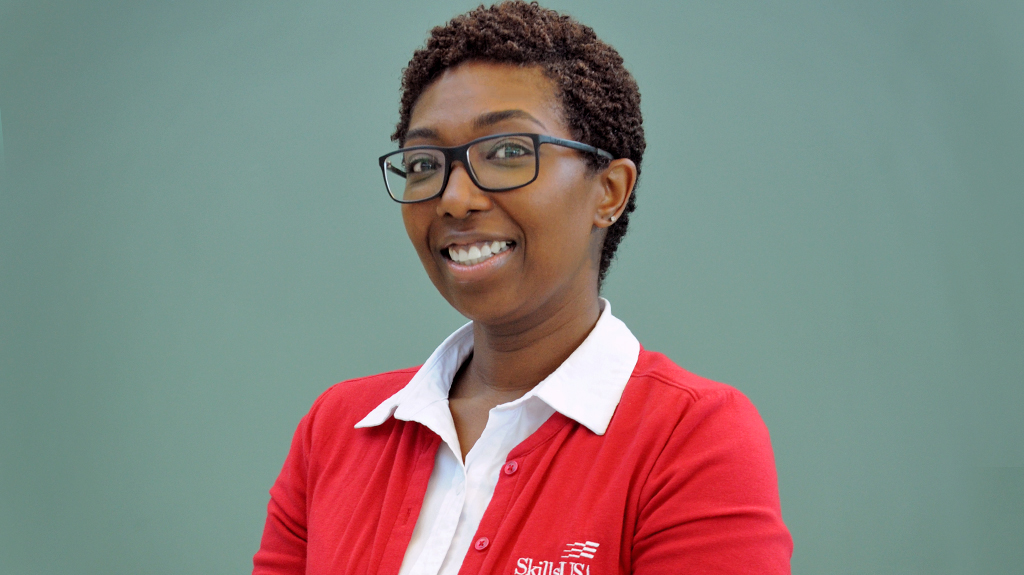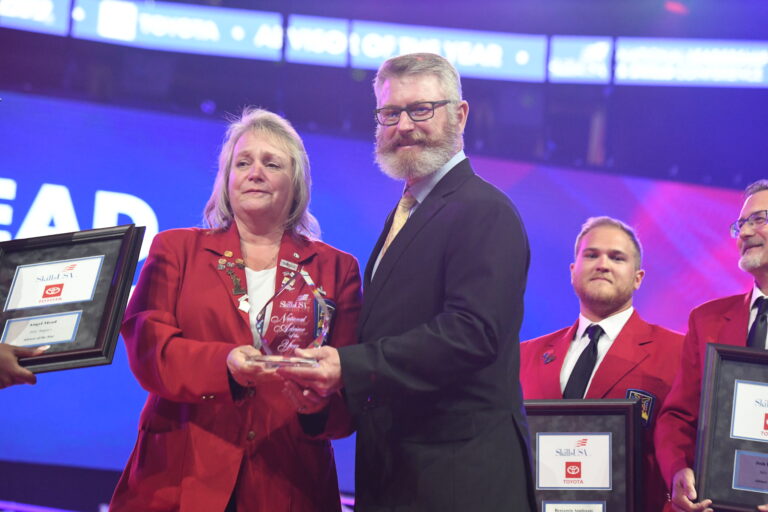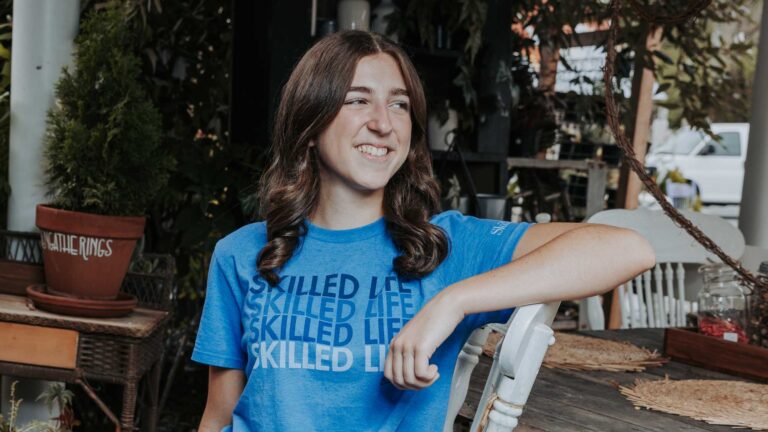Photo by Lloyd Wolf
Crystal Wright, 36, is an example of the SkillsUSA Framework in action, that combination of personal, workplace and technical skills grounded in academics that helps SkillsUSA fulfill its mission to empower its members to become world-class workers, leaders and responsible American citizens. Wright is SkillsUSA Georgia’s college/postsecondary president, a national silver medalist in practical nursing and a graduate of Georgia Piedmont Technical College (GPTC). As a working nurse and clinical unit manager at Legacy Transitional Care and Rehabilitation in Atlanta, Ga., Wright currently manages a floor of roughly 63 patients, around 20 nurses and a seemingly endless number of certified nursing assistants. Her road to career fulfillment, however, hasn’t always been smooth; it’s taken some unexpected — sometimes painful — turns, including one recent twist: Wright has tested positive for coronavirus and is, at the time of this writing, in quarantine. If the rest of her story is any indication of how she’ll handle this latest setback, though, it’s a good bet she’ll come out stronger on the other side.
Following in the footsteps of her parents, both of whom went to prestigious colleges, Wright always dreamed of higher education. After high school, she entered Clark Atlanta University. She always knew she was interested in the medical field (“nurturing is my nature,” she says) and eventually decided to pursue nursing. Shortly before earning her degree, however, a family crisis forced her to put her plans on hold. “My parents were going through a divorce,” she explains, “and my mother fell into a deep depression.” That depression was so severe that Wright decided to leave school and return home to offer support for her mother and to care and provide for her four younger siblings. During the years that passed, Wright worked as an after-school instructor, a receptionist and a pharmacy cashier while also earning her nursing assistant certification.
During those challenging times, however, Wright always knew she’d return to school to finish what she’d started. When that day finally arrived, Wright had every intention of finishing her program as quickly as possible to make up for all the time she’d lost. “My goal was to get my nursing license and go to work,” she says. “My focus was to get in, get out.” Wright’s instructors had other ideas as they began to take notice of her exceptional leadership and technical skills. One of those teachers — Melanie Kramber — approached Wright and suggested she get involved with SkillsUSA. Wright reached out to her school’s student activities coordinator to find out more, and what she learned piqued her interest. It didn’t take long for “interest” to become “commitment.” “I did go and compete in the practical nursing contest, and I won gold at state,” Wright recalls. “Once I got to nationals, I really understood how big SkillsUSA is.”
At SkillsUSA’s national conference in 2017, Wright won a silver medal in Practical Nursing. “That gave me the confidence, knowing that I was actually capable of performing the skills that I was taught in school in my nursing career,” she explains. “And I fell in love with SkillsUSA. I saw how much I could learn from just that one year of competing. How much it taught me and the confidence it gave me.”
Reaching for Her GOAL
With renewed belief in her abilities following her national conference experience, Wright graduated at the top of her nursing class. The following September, she passed her National Council Licensure Examination (NCLEX) on her first attempt and became a licensed practical nurse (LPN). By October, Wright had accepted a nursing position — her first — at LCTR. Less than six months later, she was promoted to clinical unit manager.
Those accomplishments are praise-worthy enough when taken at face value. When learning of yet another mental health crisis Wright was dealing with at the time, they’re even more impressive. In the final term of her LPN program, Wright lost her fiancé to suicide, the result of yet another long struggle with depression.
“I had the strength and the perseverance to make it through that situation,” Wright remembers. “It was through the help of my instructors, my coordinators, friends, family and my college organizations. There’s a program called ‘Aspire’ that offers counseling to students, so that resource was available to me. I utilized all of those resources and was able to get through and continue on to be so successful.”
Kaye Henry, one of Wright’s instructors, was aware of what Wright had been going through while still managing to achieve her goals. So impressed was Henry that she nominated Wright to be part of the 2018 Georgia Occupational Award of Leadership (GOAL) program. The GOAL program acknowledges excellence in Georgia’s technical education students. Top students are selected annually from each of the state’s 22 technical colleges, and that list is narrowed down through regional competitions to nine finalists. A state-wide winner is chosen each spring.
Wright’s instructors encouraged her to share her story as part of the competition … the issues with her mother, the loss of her fiancé, the wreckage of personal plans and dreams. At first, Wright was hesitant and concerned that listeners might find the story of her loved ones’ struggles with mental health too challenging. “I didn’t think I was going to win,” she says. “I felt like my story was too sad. My coordinator, she had to talk to me. She said, ‘You know there’s no reason you can’t do this. The only thing stopping you is you. And this is the time for you to step into your greatness.’ And that’s all it took for me to move forward and move out of my own way and take the opportunity to see what would happen.”

Wright decided to share her story, and in 2018 she was chosen as the statewide GOAL winner. She received the program’s highest honors, including a new 2018 KIA Optima and the opportunity to share her message of mental health awareness with students at colleges across the state of Georgia. She describes her win as an amazing experience.
“I found that as much as I thought my story was too sad, there are so many other people who have been through that same experience or just need somebody to talk to. It’s amazing how many people have reached out to me, so being able to help them is the greatest reward for me.”
Battle Plans
Throughout the ups and downs, Wright always makes it a point to learn and grow from her experiences. It’s a strategy that has proven to be an absolute necessity as the early part of 2020 continues to unfold.
Following her GOAL win, Wright’s vision for her future expanded to include mental health advocacy, and she set her sights on becoming a mental health nurse practitioner. With that dream in mind, she has since been focusing on completing the prerequisites for the next phase of her education. In October of 2019, she became an infection control nurse in her unit and, as part of her final term, she also completed Center for Disease Control (CDC) training for the handling of infectious diseases. With all of her coursework completed in December, she made plans to take her Test of Essential Academic Skills (TEAS) exam in spring. This exam allows students like Wright to apply for registered nursing programs at colleges and universities in Georgia.
At the time of Wright’s training, little was known about COVID-19, the disease that would soon become a global pandemic. By February of 2020, however, concerns about the disease’s spread had reached the United States. The state of Georgia reported its first positive cases of COVID-19 on March 2, and by March 16, the city of Atlanta had declared a state of emergency.
As part of her position as infection control nurse, Wright is responsible for monitoring types of infections, tracking outbreaks among her patients and staff, and implementing measures to prevent the spread of infectious disease. Legacy Transitional Care and Rehabilitation houses both long-term residents and patients in short-term rehabilitation. Since many of its patients travel to other health care facilities for critical services, there is no way for the center to remain in total quarantine. Wright says that when she studied subjects like microbiology and infectious disease in the classroom, she had no idea how quickly she would need to put what she learned into practice. She leaned on all of her considerable education and experience to meet the challenge head-on and set to work finding ways to prevent an outbreak of COVID-19 among her patients for as long as possible.
“It got to the point where it was inevitable,” Wright reports. “More of a ‘when’ we get a case, than an ‘if’ we get a case.” Wright didn’t realize at the time that one of those cases would be her. As of mid-April, the facility had recorded several positive cases among patients and staff, but Wright reported that, overall, the spread had been slow. As for Wright and her fellow health care workers, the hours had been long. Wright continued her critical work until April 16, when she began experiencing symptoms consistent with COVID-19. After being tested, it was confirmed: Wright had contracted the virus she was working so hard to protect her patients from. As of this writing, Wright is nearing the end of her quarantine. She’s feeling better, but “still somewhat symptomatic.” What’s most difficult for Wright is her inability to do what she does best: take care of those who need her. “I want to be at work now,” she says, “because I know that my residents and coworkers need me. But I also know that the best thing for me right now is to be at home.”
Learning and Leading
Looking ahead, Wright hopes to attend Perimeter College at Georgia State University, but with TEAS examinations halted in the state, she’s currently unsure when she will be able to take her exam and apply to a registered nursing program. With so much uncertainty, she says she’s falling back on lessons learned in SkillsUSA. “I’ve learned essential professional and interpersonal skills,” she says. “It’s been amazing.”
“Being a leader and having to step up in this time of crisis,” she explains, “I’ve been scared myself, but I’ve still had to be that leader for my fellow students and my co-workers.”
Like so much of what she’s been through, Wright views this time as a learning experience, one that is allowing her to continue focusing on her passion: mental health awareness and advocacy. She says that in times like these, the need for awareness is even more critical, so she’s continued to reach out to students, coworkers and patients.
“I speak about it every day,” she says. “I’m open and willing to share my story and my experiences. If they need to speak to somebody, I just let them know that even though we are isolated and have to be apart, we’re still all in this together. You do still have somebody there and we are going to get through this.”
Mental Health Awareness Resources:
The National Suicide Prevention Lifeline provides 24-hour free and confidential support for individuals in distress, and prevention and crisis resources for you or your loved ones. Learn more at:
www.suicidepreventionlifeline.org
Teachers and advisors can find mental health resources at:
www.mentalhealth.gov/talk/educators
Crystal’s winning GOAL speech:











